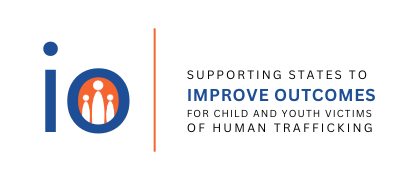About
(FY19 AND FY22)
Oregon Department of Justice
Trafficking Response and Intervention Program: Building a Comprehensive Approach to Human Trafficking in Oregon
In FY19 and FY22, the Oregon Department of Justice, Crime Victim and Survivor Services Division (CVSSD), was awarded an Improving Outcomes grant. Oregon has outlined key gaps to address during its grant period of performance, including identifying victims of sex and labor trafficking; providing identified victims with services; establishing statewide direction and support with standardized policies, procedures, and training; creating screening tools for use outside child welfare; supporting law enforcement; and establishing standards for data collection across the multidisciplinary fields that interact with trafficking victims.
The overarching goal of this project is to improve local community response to identification of child and youth victims of sex and labor trafficking and increase service provisions by supporting and coordinating a consistent statewide response that is trauma informed, victim centered, survivor- informed, and that spans multiple disciplines. Toward that end, the CVSSD is targeting the following seven objectives: (1) develop crisis- and non-crisis response protocols for Oregon’s 13 local task forces to use and adapt that identify best practices in identifying and responding to child and youth victims of sex and labor trafficking and encourage cross-communication between jurisdictions; (2) support implementation of said protocols within local task forces through technical assistance; (3) develop protocols in partnership with state and county agencies that engage youth within corrections and encourage implementation of said protocols within those agencies and disciplines; (4) develop a unified strategy to provide training to professionals across the state to increase awareness, identification, and response to sex and labor trafficking of children and youth victims through a community-centric approach; (5) support law enforcement statewide with availability of an investigator (human trafficking analyst) to increase capacity for human trafficking investigations in a victim-centered and trauma-informed way; (6) strengthen data collection across multiple systems of care that work with and provide services to youth to collect and provide consistent, meaningful data; and (7) strengthen activities by engaging in research to improve project activities.
Oregon State Highlight
Oregon Resources
- Oregon
- Training
Indicators Recognizing and Responding to Sex Trafficking Train the Trainer
- Oregon
- Training
Indicators Recognizing and Responding to Sex Trafficking
- Oregon
- Resource Guides
Task Force Resource
- Oregon
- Policies/Practices
Stages of a Task Force
- Oregon
- Training
Understanding and Addressing Sex Trafficking in our Community (UAST) Train the Trainer
- Oregon
- Training
Engaging with Lived Experience Experts
- Oregon
- Training
Understanding and Addressing Sex Trafficking in our Community (UAST)
- Oregon
- Protocols
